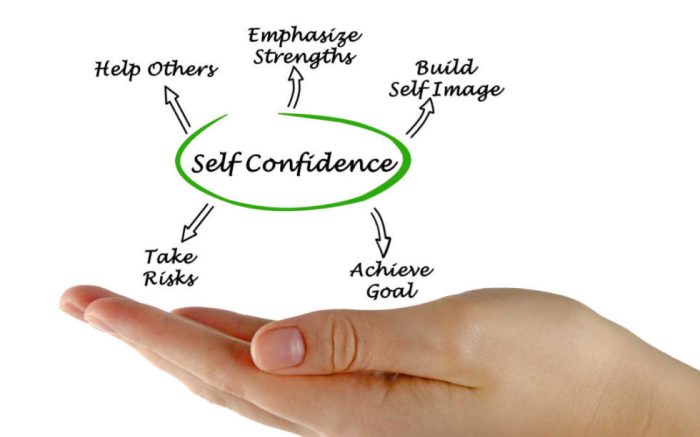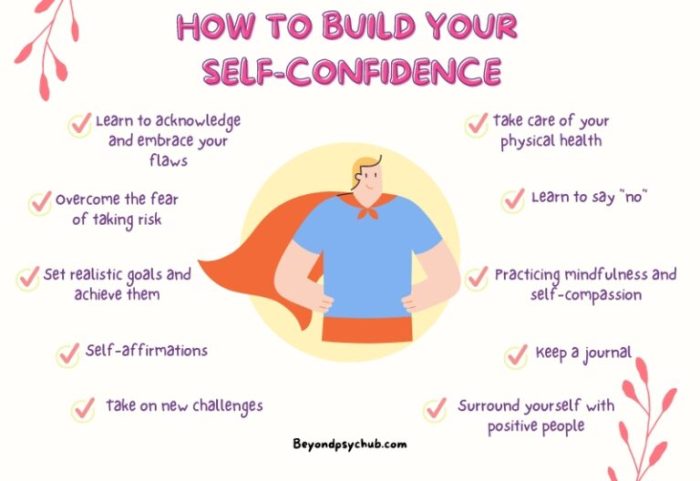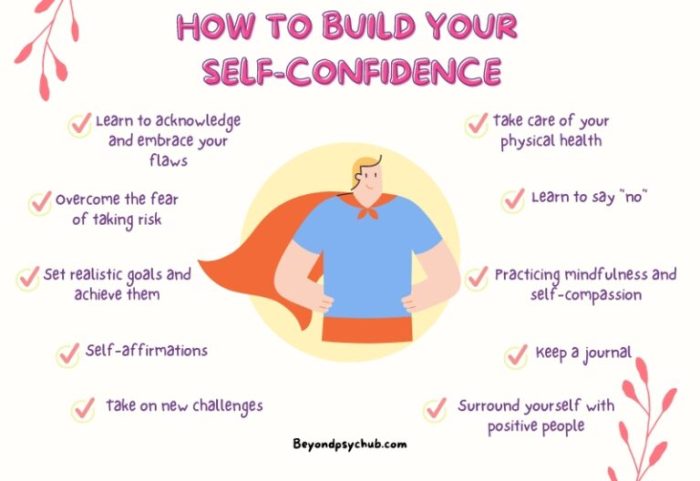Building Self-Confidence takes center stage, inviting you into a world where personal growth and empowerment reign supreme. Get ready to unlock your true potential with these game-changing insights.
Explore the factors, strategies, and mindset shifts needed to boost your self-assurance and conquer any self-doubt that stands in your way.
Introduction to Building Self-Confidence

Self-confidence plays a crucial role in personal growth as it empowers individuals to believe in their abilities, take risks, and pursue their goals with determination.
Having self-confidence impacts relationships by fostering assertiveness, communication skills, and the ability to set boundaries. In a career setting, self-confidence can lead to better job performance, increased leadership opportunities, and higher levels of success. Overall, self-confidence contributes to a sense of fulfillment, resilience, and mental well-being.
Difference between Self-Confidence and Self-Esteem
While self-confidence relates to believing in one’s abilities and skills to accomplish tasks, self-esteem pertains to the overall sense of self-worth and value as a person. Self-confidence is more specific to certain areas of expertise or activities, whereas self-esteem is a broader evaluation of one’s worthiness and acceptance.
Factors Influencing Self-Confidence

External factors play a significant role in shaping an individual’s self-confidence. Factors such as upbringing and social environment can greatly impact how confident a person feels in different situations. For instance, a supportive and nurturing upbringing can contribute to higher self-esteem, while a critical or neglectful environment may lead to lower self-confidence levels.
On the other hand, internal factors also play a crucial role in determining self-confidence. Self-talk, beliefs, and past experiences can heavily influence how a person perceives themselves and their abilities. Positive self-talk and empowering beliefs can bolster self-confidence, whereas negative self-talk and limiting beliefs can hinder it.
Setting and achieving goals is another key factor that can boost self-confidence. When individuals set realistic and achievable goals for themselves and work towards accomplishing them, they experience a sense of accomplishment and success. This process reinforces their belief in their abilities and can lead to a significant increase in self-confidence.
Impact of Setting and Achieving Goals on Self-Confidence
- Setting goals provides a sense of direction and purpose, which can increase motivation and confidence.
- Achieving goals gives a sense of accomplishment and boosts self-esteem.
- Each successful goal attainment reinforces the belief that one is capable and competent.
Strategies for Building Self-Confidence
Building self-confidence is essential for personal growth and success. By incorporating positive affirmations, self-care practices, stepping out of comfort zones, and cultivating a growth mindset, individuals can boost their self-assurance and achieve their goals effectively.
Role of Positive Affirmations and Self-Care Practices
Positive affirmations are powerful statements that help rewire our thinking patterns and boost self-esteem. By practicing daily affirmations such as “I am capable” or “I believe in myself,” individuals can reshape their mindset and build confidence. Additionally, self-care practices like exercise, proper nutrition, mindfulness, and adequate rest play a crucial role in promoting overall well-being and self-confidence.
Stepping Out of Comfort Zones
Stepping out of comfort zones is a crucial step in building self-confidence. By facing challenges, taking risks, and trying new experiences, individuals can expand their capabilities and prove to themselves that they are capable of overcoming obstacles. Embracing discomfort and pushing boundaries fosters personal growth and resilience, ultimately leading to increased self-assurance.
Cultivating a Growth Mindset
Cultivating a growth mindset involves embracing challenges, persisting in the face of setbacks, and seeing failures as opportunities for learning and growth. By reframing negative thoughts into positive ones, individuals can develop a belief in their ability to improve and succeed. Adopting a growth mindset encourages continuous learning, resilience, and adaptability, all of which contribute to enhanced self-confidence.
Overcoming Self-Doubt
Self-doubt can be a significant barrier to building self-confidence. It often stems from negative thoughts and beliefs that can hold us back from reaching our full potential. Overcoming self-doubt requires challenging these negative thoughts, seeking support from mentors or therapists, and drawing inspiration from personal stories of resilience and growth.
Challenging Negative Thoughts and Beliefs
One technique for overcoming self-doubt is to challenge negative thoughts and beliefs. This involves identifying irrational or unhelpful thoughts and replacing them with more realistic and positive ones. By questioning the validity of our negative beliefs, we can begin to reframe our mindset and build a more confident outlook.
Seeking Support from Mentors or Therapists
Seeking support from mentors or therapists can also be instrumental in overcoming self-doubt. Mentors can provide guidance, encouragement, and perspective to help us navigate challenges and build confidence. Therapists, on the other hand, can offer professional guidance and tools to address deep-rooted insecurities and negative thought patterns.
Personal Stories of Overcoming Self-Doubt, Building Self-Confidence
Sharing personal stories or examples of overcoming self-doubt can be incredibly inspiring. Hearing about others who have faced and conquered their self-doubt can motivate us to do the same. Whether it’s a friend, a family member, or a public figure, knowing that others have overcome similar struggles can instill hope and belief in our own ability to rise above self-doubt.
Body Language and Self-Confidence
Body language plays a significant role in influencing self-confidence and how others perceive us. The way we carry ourselves through non-verbal cues can greatly impact our self-esteem and how we are viewed by those around us.
Practicing Confident Body Language
Practicing confident body language involves maintaining good posture, making eye contact, and using open gestures. These small adjustments can make a big difference in how confident you appear to others.
- Stand tall with your shoulders back to convey a sense of confidence and authority.
- Make eye contact with others to show that you are engaged and interested in the conversation.
- Use open gestures, such as keeping your arms uncrossed, to appear more approachable and confident.
Power Posing and Its Impact
Power posing refers to adopting expansive postures that convey confidence and power. Research has shown that engaging in power poses can actually increase feelings of confidence and reduce stress levels.
By adopting a power pose for just a few minutes before a high-pressure situation, you can boost your self-confidence and perform better.
